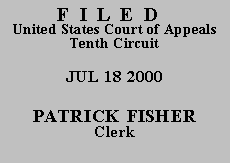

| TIMOTHY R. LOCKABY, |
|
| v. | |
| KEN KLINGER, |
The magistrate judge's report and recommendation concluded that Mr. Lockaby's petition should be denied as untimely. Because Mr. Lockaby's challenged conviction became "final" before the effective date of the Antiterrorism and Effective Death Penalty Act (AEDPA), 28 U.S.C. § 2241, the one-year tolling provision set forth in § 2242(d)(2) began to run on April 24, 1996. See Lindh v. Murphy, 521 U.S. 320, 326-27 (1997); Hoggro v. Boone, 150 F.3d 1223, 1225 (10th Cir. 1998). Mr. Lockaby did not seek post-conviction relief in state court until three months after the one-year period had expired. Mr. Lockaby's claims for equitable tolling are misplaced, because he has not demonstrated any extraordinary way that he has been prevented from asserting his rights. See Miller v. Marr, 141 F.3d 976, 978 (10th Cir. 1998). In addition, Mr. Lockaby has not asserted his factual innocence. See Bousely v. United States, 118 S. Ct. 1604, 1611 (1998). The district court adopted the magistrate judge's report and recommendation.
We have thoroughly reviewed Mr. Lockaby's application for a certificate of appealability, his brief, the magistrate judge's report and recommendation, the district court's order and the entire record before us. We DENY Mr. Lockaby's application for a certificate of appealability for substantially the same reasons set forth in the magistrate judge's report and recommendation. We also DENY his motion to proceed in forma pauperis and DISMISS the appeal.
Entered for the Court,
Robert H. Henry
Circuit Judge
*.This order and judgment is not binding precedent, except under the doctrines of law of the case, res judicata, and collateral estoppel. The court generally disfavors the citation of orders and judgments; nevertheless, an order and judgment may be cited under the terms and conditions of 10th Cir. R. 36.3.
**. After examining the briefs and appellate record, this panel has determined unanimously that oral argument would not materially assist the determination of this appeal. See Fed. R. App. P. 34(a)(2); 10th Cir. R. 34.1(G). The case is, therefore, ordered submitted without oral argument.